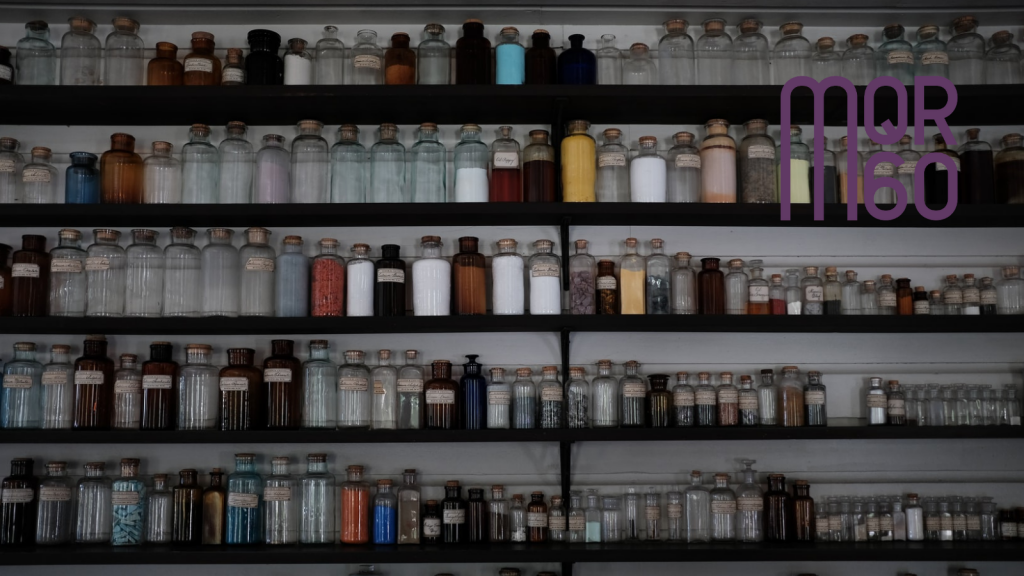Why I Chose It: Michigan Quarterly Review Reader Michael M. Weinstein introduces Lucia Perillo’s essay “Medicine” from our Winter 2021 issue.
The poet Lucia Perillo refused to mince words. Evasion was a brand of euphemism for which she had neither the time nor the inclination. In the opening sentence of her essay, “Medicine,” she writes, “First thing that happened when I got diagnosed with the terrible debilitating incurable disease was that my mother urged me to see the famous holistic doctor in Seattle.” This sentence tells you everything you need to know—not just about Perillo’s situation (which is so grim that its awfulness scarcely needs emphasis), but about her attitude towards it, which swerves from fatalism to anticlimax so fast that it makes you realize dark humor has been dread’s underbelly all along.
Even in her prose, Perillo demonstrates a poet’s panache for marking the beats—often funny, sometimes painful or unwelcome—that moments of self-recognition make in our thinking. Watch how she orchestrates the awkward realization, at the holistic doctor’s office, that she has assumed a place among what Susan Sontag once called “the kingdom of the sick”:
[The] waiting room [was] always under construction… This gave an especially pathetic aspect to the stricken, who looked like citizens of a Soviet republic that no longer existed. Perhaps because they trembled in their winter coats. Oh right, I had to remind myself: Now you are one of the stricken. Where we trembled in our winter coats.
That grudging, inevitable shift from “they” to “we” encapsulates, like a bitter pill, the moment of acknowledgment that one’s life is no longer what one thought it would be. One of Perillo’s many gifts is her capacity to condense wisdom in ways that are pithy without oversimplification, and impeccably neat in their presentation of hard truths she declines to sanitize. “Being afflicted,” she writes, “is expensive because hope will make a person throw a lot of coins into its wishing well.” More surprising still, she goes on, “The clinking of these coins creates a communal music, to which ever-changing subsets of people dance.” Perillo’s “Medicine” presents sickness—that most private, most inexorably embodied state of being—as a public ritual. And, like all rituals, to find oneself unwittingly at its center is to see one’s afflictions spiritualized, monetized, aestheticized, by those who have their own stakes in the performance.
Part of the pathos of Perillo’s essay comes from the honesty with which she shows her own cynicism about alternative medicine wilting under the pressures of illness. In search of relief, she makes her way to the homeopath, the acupuncturist, the holistic doctor in the strip mall, the psychic healer, and a woman who stabs her with bee stingers. Perillo’s reluctance points at her (unspoken) desperation, and yet, her essay achieves a weird joy through the aplomb of her descriptions. After the bee-stinging session, she observes, “my knee was still big though the swelling had withered somewhat, like an old cantaloupe.” Perillo is one of the great practitioners of what the Russian Formalist critic Viktor Shklovskii termed ostranenie, “enstrangement.” Under her pen, figuration becomes a way to capture both the immediacy and the oddity of the body one can neither master nor escape.
A reckless sanguinity, it turns out, is one of disease’s comorbidities. On the verge of undergoing yet another dubious treatment, Perillo writes, “Though I was skeptical by now, hope niggled me, as always.” Even when everything points to death—which, in a poem, she once called “the B-side…nobody’s talking about”—and even as she sees her own decline through the lens of a friend’s progress (“for a while we both walked with crutches, but then he got better while I got worse”), Perillo’s writing remains irrepressibly vigorous. Even her litanies of remedies—“emu oil (7%), methylsulfonyl methane, oleyl alcohol (and) zanthoxylum alatum extract, horse chestnut”—conjure up the glee a child feels when a nonsense rhyme lets her perceive, through the bluster of phonemes, the strength of her voice.
In a 2014 interview with the American Poetry Review, Perillo responded to a question about “battling” her condition with a characteristically swift and funny cliché demolition: “I don’t battle M.S. I relent to its humiliations.” How, the interviewer asked, did she avoid falling into depression? “I’ve already fallen,” she answered. “This is the voice from the swamp.” For Perillo, a wildlife researcher and conservationist by training, the “swamp” is no idle metaphor. What image could more perfectly capture the contradictions of finding oneself stuck in a living/dying body, in the shifting quicksand of disease’s situation, stagnant yet fecund? Perillo’s genius is to illuminate, even to celebrate, the unexpected details to which decay can shock one awake. She passed away in 2016, but the curative power of her words persists. “Medicine” reminds us, in this plague year, that it is our choice to persist in a joyful attunement to strangeness—which is to say, to life.
Medicine
1. First thing that happened when I got diagnosed with the terrible debilitating incurable disease was that my mother urged me to see the famous holistic doctor in Seattle. I was surprised to find his office in a strip mall, his waiting room always under construction, with sheets of milky plastic flapping across holes where doors and windows had once been. This gave an especially pathetic aspect to the stricken, who looked like citizens of a Soviet republic that no longer existed. Perhaps because they trembled in their winter coats.
Oh right, I had to remind myself: Now you are one of the stricken. Where we trembled in our winter coats.
2. The famous holistic doctor could not retain in his care all those who made appeals, so he passed me along to another doctor in his clinic, a woman whose pink complexion I took to be an indicator of health. But she was very fat, and this made me suspicious of her advice, which pertained mainly to my diet and my ingestion of the expensive vitamins she had me buy. Simultaneously, I felt queasy about my prejudice regarding her size, which revealed the shallowness of my character. So I returned diligently to my appointments though she also had an irksome habit of hugging me
before I left.
For a while I carried around a knapsack full of vitamin bottles. In those days my sorrow slaked on such rare occasions that I felt like an observer long-drenched, when suddenly a sunbeam shoots through a thunderhead.
Because I was both young and sad, during this phase of my treatment I also went to London to track down a man I loved, and there the slaking happened when I found an exhibit in the British Museum of watercolors painted by the poet William Blake. They were displayed behind little velvet curtains so as not to be faded by even the dim museum light. Each time I lifted my arm to lift the cloth, the vitamins rattled like an aboriginal percussion instrument, like a gourd full of soft pebbles, background music that played while Nebuchadnezzar crawled on his knees and after Satan inflicted the boils on Job.
3. The doctor in practice with the famous holistic doctor urged me to remove the fillings in my teeth because they contained the toxin mercury. She recommended a dentist in Tacoma who specialized in this procedure. The filling particles were so poisonous that his assistant used a device like a Dustbuster to suck them away as he worked with his drill.
I was also instructed to drink a special soup called “Bieler’s broth,” which contained a variety of green vegetables cooked in bouillon. I felt inexplicably foolish making it from his recipe, particularly when it came time to drink the bland puree. Its pleasant banal taste insulted me, as if I were a sick child needing to be comforted, when my system really cried out for an herb to be shocked with.
Yet what I liked about this guy was how he didn’t engage in the annoying trademark behavior of dentists: asking questions when your mouth is full of tools. Instead he kept up a steady comic patter with his assistant, while his office stereo played what is sometimes known as “novelty music.” In particular I remember the song “Guitarzan,” a semi-spoken word number that gave both the dentist and his assistant the chance to chime in, respectively, as Tarzan and Jane. Tarzan mumbled a low-pitched rhyme, while Jane’s high wail was supposed to conjure a woman clinging to a vine, swooping through the trees.
4. My coworkers at the small college where I worked of course gave me advice about alternative forms of healing that they’d found to be of use. An education professor gave me a book by the famous Ayurvedic doctor who’d not yet become famous. In the book he made an obvious point that nonetheless was stunning to me: how the mind says Now my leg will move and a complex bio-chemical process is unleashed that in fact causes the leg to move.
So I thought: Now my leg will move. But it didn’t.
5. And a sociology professor gave me the name of her Chinese doctor in Seattle. His office was in the international district, where I liked to go to a pet store whose narrow aisles were crowded with fish tanks. The tanks invariably contained dead fish, which nobody got exercised enough about to remove. I read this as a sign of clear-headedness—mortality was not to be afraid of.
The doctor’s English was barely decipherable to me, and I understood that I represented just a small subset of his patients too stupid to be able to speak Chinese. He responded the same way Americans do when traveling abroad and wishing to be understood made his voice so loud I cowered.
“Stick out your tongue!” he commanded. Then he consulted his big book of tongues, whose photos’ lurid colors so contrasted with their orderly array that they left me dizzy.
“It is the liver!” he shouted after a few minutes of flipping. Taking a Q-tip and unwinding the cotton from one of its ends, he stabbed a spot inside my ear. I understood him clearly when he said I should do this throughout the day, hard enough to hurt.
6. When I first moved to this town there was only one therapist who practiced the technique called “jin shin jitsu.” She also was a counselor, so our sessions comprised two distinct halves. First I would weep and then she would touch me.
She placed her hands on two different topographical features of my body, say nose and shoulder, creating a kind of circuit while soothing music played. Soothing music annoys me, at least until my annoyance builds up enough momentum to burst through to surrender like the car leaping through the paper skin inside the hoop of flame.
But I grew suspicious, as our weeks of weep-and-touch went by, that she wanted to cut down on the weeping and up the touching half. I got the impression she didn’t think I was gaining ground on my misery quickly enough. And was it just me, or had she changed her manner of offering the tissue box? Where once had been her tentative nudge, was there now a disgruntled thrust?
7. It was in my hunt to score some vitamin B shots that I learned of Dr. Nimms, whose office I found—oddly—in a residential apartment complex south of town. The person who mentioned his name was the same woman who’d sent me to the Chinese doctor in Seattle, and she confided that, though she knew he gave the shots, she wouldn’t necessarily recommend him. She’d seen him for a case of strep throat and had allowed him to give her a pelvic exam because he said he needed to check for signs of yeast. Then she learned other women had filed complaints. Though her humiliation obviously pained her, she was grateful for his recipe for a delicious soup that she still made.
No, she said in answer to my question, it was not called Bieler’s broth.
Dr. Nimms himself answered the door of his apartment/office, which was long and narrow, with a windowless storage room between the front office (no receptionist) and the back bedroom, which served now as his examination room. Before he gave me the shot, he asked a dozen questions, mostly standard ones. When he asked if I had any sexual dysfunction, I said with uncharacteristic self-assertion: Why do you want to know?
“Sexual dysfunction is indicative of many underlying conditions,” he answered, backpedaling but not quite defensive: it seemed as if he knew I knew. But soon he gave up on his line of questioning and administered the shot into my buttocks, after I cinched down my skirt as few inches as necessary in the storage room.
Afterward he said, “I believe there is hope for you. I had another patient with multiple sclerosis who came here crying”—here he did a pantomime of a woman in distress—”and now she is getting married, after I made her better.”
He lifted his shirt and swatted his chest with his hands. “Guess how old I am!” Sixty? “Almost seventy! And I win swimming competitions with men half my age.”
And his body was remarkably taut—it was only his eyes that looked defeated. Their black interiors not taut at all but more like raisins, a desiccated fruit.
8. Soon I learned that I could get the B shots from a naturopath. The one whose office was nearest where I worked specialized in colon irrigation. She wore heels and tight-fitting brightly colored business suits that did not flatter her figure.
This amused me because, soon into our first meeting, she told me about how she’d been so constipated as a child that she moved her bowels only once a week. Her parents kept a stick by the toilet so she could chop her stools before she flushed, and though she must have told the story all the time it amused her too, so much so that afterward she’d use a tissue to blot the mascara stains that were ruining the rest of her makeup, before she signaled that it was time to return to more sober work by hitching down her skirt where it had ridden up her thighs, having skidded along the shimmering surface of her nylons.
You can read the rest of Lucia Perillo’s essay “Medicine” in our Winter 2021 issue.




